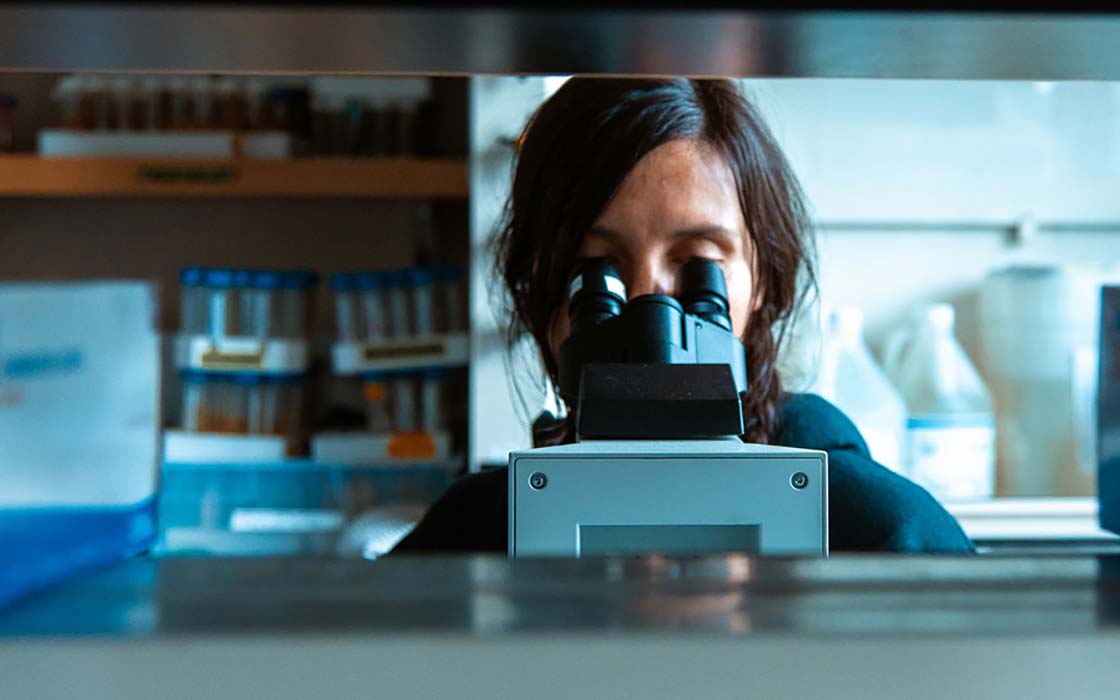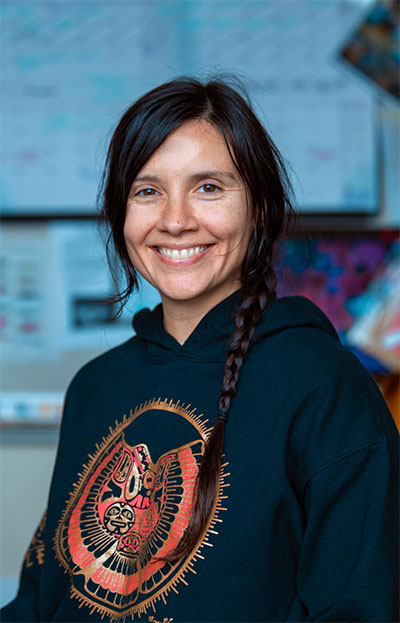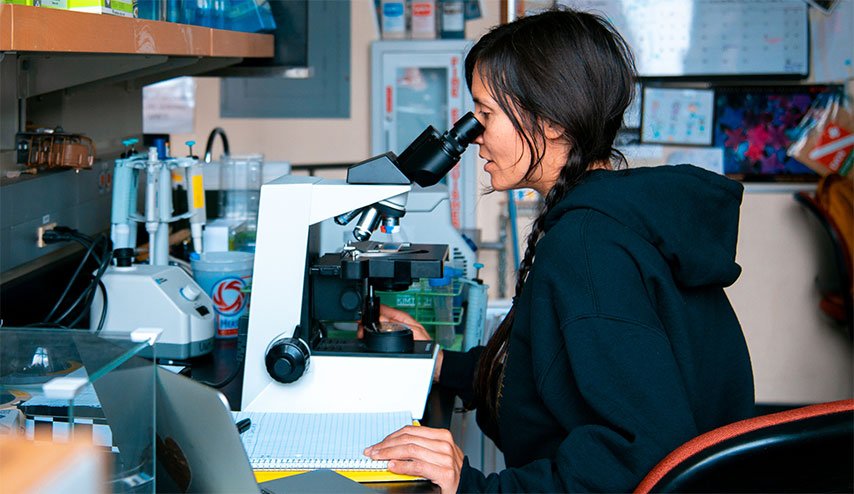
The Music Inside
Environmental science student Hozoji Matheson-Margullis brings her chops as a rock-band drummer to her quest to preserve and restore Puget Sound.

There’s music inside Hozoji Matheson-Margullis, a persistent rhythm that drives her to explore. The University of Washington Tacoma junior plays multiple instruments including drums, piano and guitar. Recently, she picked up a different kind of instrument: the microscope.
Matheson-Margullis works in the Becker Lab which is run by Associate Vice Chancellor for Student Success Bonnie Becker. “I count bivalve larvae,” said Matheson-Margullis. “The goal of this project is to find out whether or not these larvae are purposefully moving themselves into eel grass beds to protect themselves from ocean acidification.”
When she’s not looking through a lens, Matheson-Margullis is pounding out beats for the local rock group Helms Alee. “Music is soul fulfilling, it just feels good,” she said. “The ability to express yourself freely and get as weird as you want feels most accessible to me through rock music.”
The 37 year-old Matheson-Margullis never pictured herself as a scientist. “Music was the only place where I saw myself fitting in,” she said. The story of how a drummer known for her “pummeling drum chops” decided to pursue a degree in environmental science can be told in three beats.
Beat 1: To Be in Touch with the Supernatural
Matheson-Margullis’ first name has its origins in the pages of a Navajo romance novel. Hozoji is a word in the Navajo language. In English the word means “to be in touch with the supernatural.” “My mom read this book while she was pregnant and the word was use multiple times,” said Matheson-Margullis. “She loved it.”
Matheson-Margullis grew up in Tacoma and graduated from Stadium High School. “As a little kid I thought my name was embarrassing, that it set me apart too much,” she said. Instead Matheson-Margullis went by her middle name: Roseanna or simply Annie. “It wasn’t until I was 23 that I realized how much I love my name,” said Matheson-Margullis. “It’s beautiful and it’s weird.”
Matheson-Margullis is an enrolled member of the Puyallup Tribe of Indians. Her parents were active in the fish wars of the 1960s and ‘70s. The protests were aimed at pressuring the federal government to honor fishing rights documented in the Point No Point Treaty.
Despite growing up near water, Matheson-Margullis had mixed feelings about Puget Sound. “I had a healthy fear of it,” she said. “When you look at it from the surface all you see is this weird, dark brown pit.”
At age 15 Matheson-Margullis received her first drum set. At 17 she joined her first formal band. “I got jobs that I could quit no problem because if they told me no about going on tour then I’d say ‘I quit and I’ll find some other crap job,’” she said. “I was perfectly comfortable with that being the trajectory of my life for the foreseeable future.”
Beat 2: Wingman
A few years later Matheson-Margullis found herself as the wingman on a blind date. “My cousin met a Puyallup Tribal Member online and she asked me to come along so it wouldn’t be weird,” said Matheson-Margullis. The trio went out. At one point Matheson-Margullis and her cousin’s date started talking. “I asked him what he did for a living,” said. “He told me that he was a geoduck harvester.”
Intrigued, Matheson-Margullis decided to sign up for the training. Geoduck diving is hard and dangerous work but it’s also flexible and potentially lucrative. “I was 95% certain that I’d fail miserably,” said Matheson-Margullis.
Matheson-Margullis’ fear of Puget Sound came to a head during her training. She’d have to take the plunge if she wanted to be successful harvester. “I fell in love with it the first time I went underwater,” said Matheson-Margullis. “I was hooked.”
The next six years of Matheson-Margullis’ life were largely spent either underwater or on tour. Matheson-Margullis was an independent contractor for the Puyallup Tribe and could come and go as she pleased. She kept her own time, but like any good drummer, Matheson-Margullis understood she was part of something bigger. “There’s color underneath those dark waters,” she said. “It makes me happy knowing there’s beautiful life down there that persists despite all of the nonsense that’s happening on the other side of the water.”
In 2015 Matheson-Margullis began diving for the Puyallup Tribe’s Shellfish Department. Over time she’d come to appreciate the delicate balance beneath the waves. “I gave up harvesting and became a shellfish tract surveyor,” said Matheson-Margullis. “I wanted to help preserve and restore Puget Sound.”

Beat 3: Rock-and-roll Scientist
UW Tacoma Assistant Professor Danica Miller floated an idea to Bonnie Becker. Miller is an enrolled member of the Puyallup Tribe. A few years ago the Puyallup gave UW Tacoma a $275,000 grant with the goal of infusing indigenous knowledge into teaching, learning and research. Miller suggested Becker bring in someone from the local Indigenous community to work for her. Becker asked around and Hozoji’s name came up.
Matheson-Margullis started work at the Becker Lab during the fall of 2017. She spent the past year in a non-student position. Matheson-Margullis already had some credits under her belt from Tacoma Community College and decided she wanted to go further. “I want to know more about what I’m looking at down there,” she said. “I want to understand that ecosystem in a better way.”
This fall marks Matheson-Margullis’ first quarter as a UW Tacoma student. She plans to continue helping in the Becker Lab. She also plans to continue touring with her band. “I see myself doing this for the rest of my life,” said Matheson-Margullis. “I love music but this work has become just as important to me.”
Matheson-Margullis wants to become a marine biologist. “I grew up swimming in this water long before I went under it,” she said. “This is my spot, my home and I want to contribute in some way to a place that is so important to me and was so important to my ancestors. These words are poetic, have a meter unique to Matheson-Margullis and her internal music.



